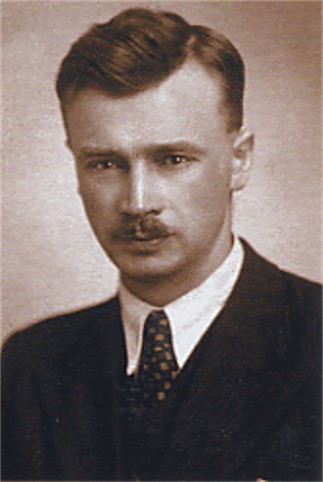Olzhych, Oleh
Olzhych, Oleh [Ольжич, Олег; Ol’žyč] (pseud of Олег Кандиба; Oleh Kandyba; other pseuds: O. Leleka, M. Zapotochny, D. Kardash, K. Kostiantyn), b 21 July 1907 in Zhytomyr, Volhynia gubernia, d 9 June 1944 in the Sachsenhausen concentration camp. Archeologist, poet, and nationalist leader; son of Oleksander Oles. Olzhych grew up in Kyiv and emigrated from Ukraine in 1923. He lived in Prague, where he graduated with a degree in archeology from Charles University in 1929. Besides his doctoral dissertation on Neolithic painted ceramics in Galicia and numerous articles on the archeological artefacts of the Neolithic Period, Trypillia culture, and Eneolithic Period in Galicia and Bukovyna, his main scholarly work in archeology was Schipenitz—Kunst und Gerüate neolittischen Dorfes (1937). After taking part in an archeological expedition organized by Harvard University, Olzhych helped found the short-lived Ukrainian Research Institute in America (Saint Paul, Minnesota) and edited its first collection of papers (1939).
In 1929 Olzhych joined the Organization of Ukrainian Nationalists (OUN), headed its cultural and educational branch, and coedited the journal Samostiina dumka. After the split in the OUN in 1940, which he strongly opposed, he went with the OUN (Melnyk faction). As second-in-command to Andrii Melnyk he represented the OUN leadership in Carpatho-Ukraine (1938–9). He was one of the leaders of the OUN expeditionary groups and took part in forming the Ukrainian National Council (Kyiv) in 1941. Until his arrest in May 1944, he directed Melnykite underground activities in Ukraine. Steadfastly refusing to break down under interrogation, Olzhych was tortured to death by Nazi executioners in the Sachsenhausen concentration camp.
As a poet Olzhych generally followed the tradition of the Neoclassicists. Often relying on historical themes to illustrate the inalienable right of Ukraine to independent statehood, his verse largely typifies the nationalist poetry between the two world wars. Sparse, strict, and forceful, it is consciously devoid of sentimentality or lyrical weakness and exhorts to heroic action and fulfilment of duty. Only two collections appeared during his lifetime, Rin’ (Gravel, 1935) and Vezhi (Towers, 1940). Pidzamche (Near the Castle) appeared posthumously, in 1946, and was followed by Poeziï (Poems, 1956) and Velychnist’ (Majesty, 1969). The latter book includes the collections as well as extant poems published in various newspapers. In 1991 Mikuláš Nevrlý edited and published in Prešov a complete edition of Olzhych's works with a biobibliography. The first extensive selection of Olzhych’s poetry to be published in Ukraine was the Smoloskyp edition Vybrani tvory (Selected Works, 2009), edited by Osyp Zinkevych with an introduction by Yevhen Sverstiuk. Among Olzhych’s important publicist writings were his Revoliutsiia rve kaidany (Revolution Breaks the Chains), which condemned Nazism and systematically exposed Nazi war crimes in Ukraine, and Dukh ruiny (The Spirit of Ruin), which criticized the tendency for internal discord and internecine strife exhibited by Ukrainians in pivotal moments of their history.
Marko Robert Stech, Danylo Husar Struk
[This article was updated in 2014.]

%20Oleh.jpg)
